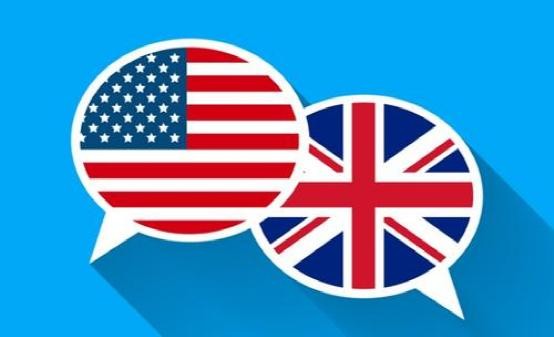美国英语和英国英语在语法方面有什么不同之处
美国英语和英国英语在语法方面有什么不同之处
■蓝燕 博士(加拿大滑铁卢大学文学院)
美国英语(American English)和英国英语(British English)是现代英语的两大区域性变体(Regional Varieties);它们的差异是多方面的,主要反映在词汇、拼写、发音和语法方面。前三个方面已有不少书籍谈及,后一个方面却谈得较少。下面就美国英语和英国英语在语法方面的主要不同之处作些整理和介绍(斜线号前面是美国英语,后面是英国英语),供大家学习参考。

1. 冠词
(1) 在某些表示时间的习语中,美国英语通常用零冠词(Zero Articles),而英国英语一般要用定冠词。例如:
all morning / all the morning
all summer / all the summer
day after tomorrow / the day after tomorrow
day before yesterday / the day before yesterday
等等。
(2) 在某些用于表示抽象概念的地点名词前,美国英语倾向于用定冠词,而英国英语往往用零冠词。例如:
to be at the home / to be at home
to be in the hospital / to be in hospital
to go to the school / to go to school
to go to the university / to go to university
等等。
(3) 在某些表示疾病的名词前,美国英语倾向于用零冠词,而英国英语一般用定冠词(目前英国英语也有用零冠词的倾向)。例如:
flu / the flu
measles / the measles
mumps / the mumps
scarlatins / the scarlatins
smallpox / the smallpox
等等。
(4) 对于某些河流和瀑布,美国英语倾向于用零冠词,而英国英语往往用定冠词。例如:
Swift River / the SwiftRiver
Clear Water / the Clear Water
Black Greek / the Black Greek
Niagara Falls / the Niagara Falls等。
(5) 对于序数词标志的街道,美国英语用零冠词,而英国英语一般要用定冠词。例如:
Fifth Avenue / the Fifth Avenue
Second Road / the Second Road
44th Street / the 44th Street
等等。
2. 介词
(1) 在某些词组或习语中,美国英语与英国英语使用介词不同。例如:
around / about midnight
at / by retail
in / for a long time
on / in train
to name sb. for / after
to travel around / round等。
街道名称前没有号数时,美国英语用on,而英国英语用in,如on / in Hazel Avenue。如果有号数,英美人都用at,如at 73 Hazel Avenue。
(2) 在表示星期几的名词前,美国英语往往不用介词on,而英国英语要用介词on。例如:
He’ll go Sunday. / He’ll go on Sunday.
Why didn’t you come here Monday evening? / Why didn’t you come here on Monday evening?
(3) 在某些名词或动词后面,美国英语往往省略介词,而英国英语通常不省略。例如:
Mary said she had no time dancing. / Mary said she had no time for dancing.
We protest U.S. intervention. / We protest against U.S. intervention.
3. 副词
对于某些副词(或词组),美国英语与英国英语在用法上不同。例如:
toward / towards
upward / upwards
over and over / again and again
right away / at once
to go around / round等。
4. 代词
对于某些代词(或反身代词),美国英语与英国英语在用法上不同。例如:
One cannot succeed unless he / one tried hard.
One should wash himself / oneself.
Hello, is this / that Fred? [打电话]
5. 连词
(1) 在非正式场合,美国英语常用连词like代替as,as if或as though。例如:
I can’t do it like / as you do.
The house looked like / as if it was about to fall down.
He stood there like / as though he didn’t know what to do.
(2) 在 so…that, so that, such…that 句型中,美国英语往往省略that,而英国英语通常不能省略。例如:
The sound is so weak you cannot hear it. / The sound is so weak that you cannot hear it.
It’s such a good chance we mustn’t miss it. / It’s such a good chance that we mustn’t miss it.
6. 动词
当动词have释义为“拥有”“占有”并用于疑问或否定形式时,美国英语用助动词do构成,而英国英语用自身形式构成。例如:
Do you have any picture books? / Have any picture books?
I don’t have any cigarettes. / I haven’t any cigarettes.
7. 助动词
在表示将来时间的陈述句中,美国英语不论第几人称一律用will,而英国英语第一人称用shall,第二、三人称才用will(例句略)。在表示征询听话人意图的第一人称疑问句中,美国英语用will,而英国英语一般用shall。例如:
Will / Shall I carry your suitcase?
Will / Shall we have dinner?
但在表示征求对方意见的疑问句中,英美人都用shall,而不能用will,如Let’s go, shall we?
8. 形容词
对于某些形容词,美国英语与英国英语在用法上不同。例如:
That’s nice / good.
We had a good / pleasant time.
She fell sick / ill yesterday.
9. 主谓一致
当句子的主语是集合名词时,美国英语多用谓语动词的单数形式,而英国英语多用谓语动词的复数形式。例如:
The audience was / were enjoying every minute of the show.
Our planning committee has / have considered your request.
值得一提的是,中国著名学者周海中先生在1983年发表的《美国英语与英国英语在语法方面的一些差异》一文中指出:美国英语与英国英语在语法方面存在着一些差异,但由于它们的相同之处远远大于不同之处,所以不会影响英语语法的规范性;因此,这方面的差异是不会影响英美人彼此交际和交流思想的。
- 发表于 2021-06-12 15:04
- 阅读 ( 3887 )






